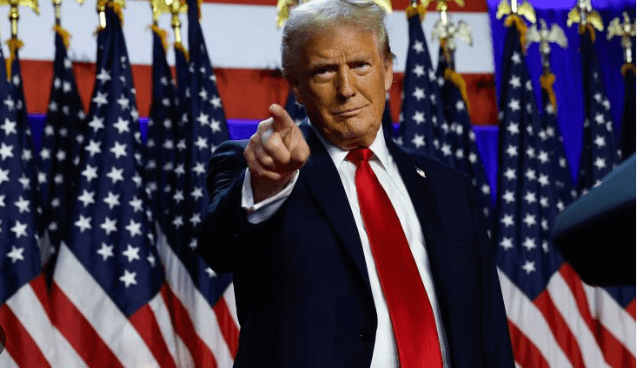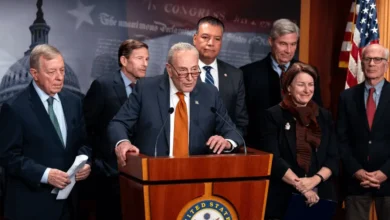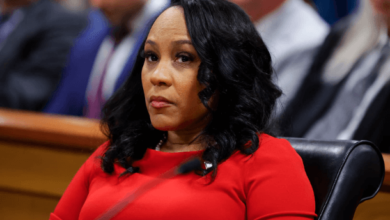Biden to Host Trump at the White House for Transition Talks After Harris’s Defeat: A Symbolic Gesture of Unity Amid Political Divide

In an unprecedented move, President Joe Biden will welcome President-elect Donald Trump to the White House on Wednesday, November 15, to initiate transition talks following Trump’s recent victory over Vice President Kamala Harris in the 2024 presidential election. Despite ongoing tensions and a delayed handover process, Biden aims to uphold the tradition of a peaceful transfer of power—a norm he has repeatedly championed throughout his presidency.
1. Overview of the Upcoming White House Meeting
In a move to showcase a peaceful transition of power, President Joe Biden will host President-elect Donald Trump at the White House for the first time since the 2024 election results. The meeting is scheduled for 11 a.m. EST on Wednesday and is intended to signal continuity in the American democratic process despite the contentious political climate.
2. Significance of Biden’s Decision to Host Trump
Biden’s decision to invite Trump reflects his commitment to upholding democratic norms, even amid political polarization. According to White House Press Secretary Karine Jean-Pierre, “He believes in the norms, he believes in our institution, he believes in the peaceful transfer of power.” This gesture is particularly significant given Trump’s refusal to extend the same courtesy to Biden after the 2020 election.
3. Delayed Transition Process: Key Issues
While the meeting is a symbolic gesture, the actual transition process remains partially stalled. The Trump-Vance transition team has yet to sign key agreements necessary for a smooth handover, including access to office space, government equipment, and information-sharing with federal agencies. According to Brian Vance, a spokesperson for the Trump transition, discussions with the Biden-Harris Administration are ongoing but have not yet been finalized.
4. Trump’s Visit to Washington: Planned Meetings
Before the scheduled meeting with Biden, Trump will meet with Republican lawmakers, including House Speaker Mike Johnson. Billionaire entrepreneur Elon Musk is also expected to join Trump at this gathering, reflecting his growing influence in U.S. politics. This meeting underscores the Republican Party’s preparation for the incoming administration as Trump solidifies his policy agenda.
5. Elon Musk’s Role in the Transition Talks
Elon Musk’s presence at Trump’s meeting with House Republicans indicates his increasing involvement in political strategy. Known for his influence in technology and social media, Musk has recently been seen as a key advisor to Trump, particularly on issues related to energy policy, infrastructure, and technology-driven defense.
6. Biden’s Commitment to Institutional Norms
Despite years of political rivalry, Biden is determined to demonstrate that America’s democratic institutions remain strong. By welcoming Trump to the White House, Biden aims to set an example of civility and respect for democratic traditions, even as Trump’s transition team has been slow to engage in formal preparations.
7. The Biden-Trump Political Rivalry: A History of Tension
The relationship between Biden and Trump has been fraught with mutual criticism. Biden, 81, has often depicted Trump as a threat to democracy, while Trump, 78, has accused Biden of incompetence. Their rivalry dates back to the 2020 election, when Trump refused to concede defeat, leading to widespread allegations of election fraud—claims that have since been debunked.
8. Potential Topics of Discussion During the Meeting
While the White House has declined to disclose specific agenda items, it is likely that Biden and Trump will discuss foreign policy, economic stability, and the state of domestic programs. The meeting offers an opportunity for Biden to emphasize the importance of continuity in U.S. foreign policy, especially regarding ongoing conflicts.
9. Foreign Policy: The Future of U.S. Support for Ukraine
A major point of contention between the outgoing and incoming administrations is U.S. support for Ukraine in its conflict with Russia. Biden is expected to urge Trump to continue backing Ukraine, though Trump has promised to end the war swiftly without clarifying his strategy. This uncertainty has raised concerns among U.S. allies in Europe.
10. The Role of the Presidential Transition Act
The Presidential Transition Act is designed to ensure a smooth transfer of power by granting the incoming administration access to critical resources. However, the delay in signing agreements has hampered the transition process. Valerie Smith Boyd of the Partnership for Public Service’s Center for Presidential Transition emphasized that these agreements are essential for interaction with federal agencies.
11. Challenges in the Transition Process
The Trump team’s hesitation to fully engage with the transition has raised concerns about potential disruptions in governance. Without signed agreements, access to federal databases, classified briefings, and coordination with existing officials remains limited, potentially delaying key decisions as Trump prepares to assume office in January.
12. Impact on U.S. Allies and Global Diplomacy
The uncertainty surrounding Trump’s foreign policy positions has left U.S. allies concerned about potential shifts in America’s global strategy. European leaders are particularly anxious about Trump’s pledge to reassess support for NATO and Ukraine. Biden’s meeting with Trump could be an attempt to secure a commitment to uphold existing alliances.
13. Public and Political Reactions to the Meeting
Reactions to the Biden-Trump meeting have been mixed. While some see it as a positive step toward unity, others view it as merely symbolic, given the stark ideological divide between the two leaders. Democratic supporters have expressed disappointment over Harris’s defeat, while Trump’s base remains energized by his return to the White House.
14. What’s Next for Kamala Harris and the Democratic Party?
Vice President Kamala Harris’s loss in the presidential election has sparked debates within the Democratic Party regarding its future direction. Many have questioned the party’s strategy and leadership, especially after Biden’s decision to step aside and endorse Harris. The coming months will be crucial as Democrats regroup ahead of the next electoral cycle.
15. Conclusion: The Road Ahead for a Divided America
The upcoming White House meeting between Biden and Trump is more than a formality; it is a test of America’s commitment to its democratic principles. As the nation watches closely, the meeting serves as a reminder that, despite deep political divisions, the peaceful transfer of power remains a cornerstone of American democracy. However, the challenges of uniting a deeply polarized country will extend far beyond this symbolic gesture.
Frequently Asked Questions (FAQs)
1. Why is Biden meeting with Trump at the White House?
- Biden is meeting Trump to demonstrate a peaceful transfer of power and uphold democratic norms, despite ongoing political tensions.
2. What is delaying the transition process?
- Trump’s team has yet to sign necessary agreements for access to office space, government resources, and classified information, which has stalled the transition.
3. Will Trump continue Biden’s support for Ukraine?
- It remains unclear. While Biden may urge Trump to back Ukraine, Trump has pledged to end the conflict without specifying how.
4. What role does Elon Musk play in the transition?
- Elon Musk is expected to join Trump’s meetings with Republican lawmakers, suggesting his involvement in shaping policy, particularly in technology and infrastructure.
5. What’s next for Kamala Harris after her defeat?
- Harris’s loss has led to introspection within the Democratic Party. The focus will now be on redefining strategy and leadership as the party looks to the future.
6. How will the delayed transition impact the government?
- Delays in signing transition agreements may disrupt continuity in government operations, potentially affecting key decisions during the early months of Trump’s presidency.



